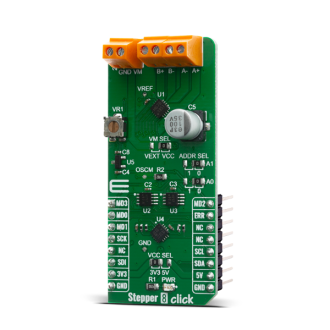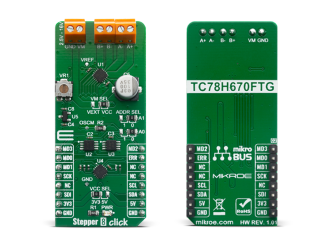
We strongly encourage users to use Package manager for sharing their code on Libstock website, because it boosts your efficiency and leaves the end user with no room for error. [more info]

Rating:
Author: MIKROE
Last Updated: 2020-06-22
Package Version: 1.0.0.0
mikroSDK Library: 1.0.0.0
Category: Stepper
Downloaded: 3507 times
Not followed.
License: MIT license
Stepper 8 Click is Click board based on TC78H670FT from Toshiba, a clock-in and serial controlled Bipolar Stepping Motor Driver which can drive a 128 micro-stepping motor with a power supply ranging from 2.5V to 16V for wide range of applications includes USB-powered, battery-powered, and standard 9-12V system devices.
Do you want to subscribe in order to receive notifications regarding "Stepper 8 click" changes.
Do you want to unsubscribe in order to stop receiving notifications regarding "Stepper 8 click" changes.
Do you want to report abuse regarding "Stepper 8 click".


Library Description
The library covers all the necessary functions that enables the usage of the Stepper 10 Click board. It initializes and defines the I2C driver and drivers that allow full control of the device to the user.
Key functions:
void stepper8_motor_start( void ) - Start Movementvoid stepper8_motor_stop ( void - Stop Movementvoid stepper8_process ( void ) - Stepper State MachineExamples description
The application is composed of three sections :
void application_task ( )
{
uint8_t status;
stepper8_motor_start( );
status = stepper8_get_run_status( );
while ( status == 1 )
{
status = stepper8_get_run_status( );
stepper8_process( );
}
stepper8_motor_stop( );
Delay_ms( 2000 );
}
Other mikroE Libraries used in the example:
Additional notes and informations
Depending on the development board you are using, you may need USB UART click, USB UART 2 click or RS232 click to connect to your PC, for development systems with no UART to USB interface available on the board. The terminal available in all MikroElektronika compilers, or any other terminal application of your choice, can be used to read the message.